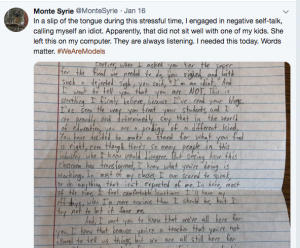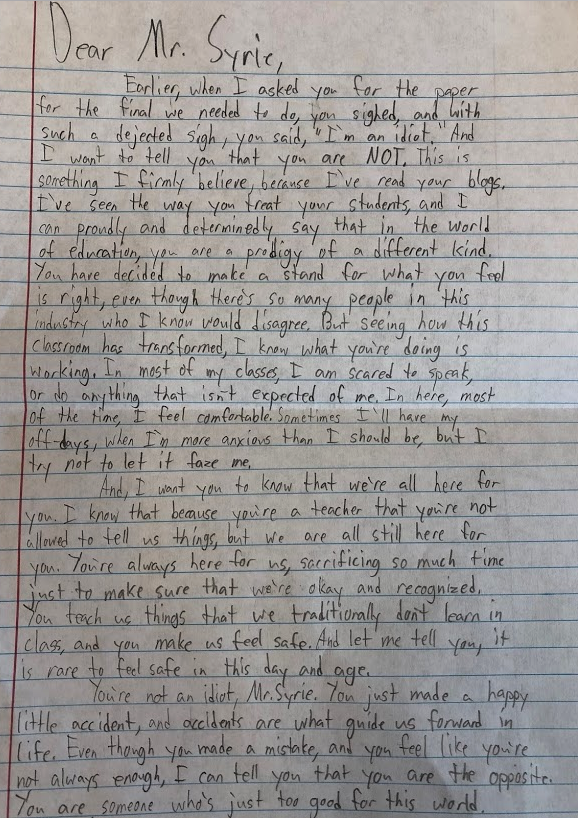After this past Friday’s Cohort 21 3rd F2F, I was prompted to think about why these days resonate so powerfully. There are all those ‘ways of knowing’ that are intangible and quite personal that tell me that these days work for me, that I learn deeply, that I am changed by the information of others. But is that enough? Let’s welcome Science to the discussion.
Then work by cognitive scientists like Antonio Damasio showed us that emotion is not the opposite of reason; it’s essential to reason. (Brooks)
In this GREAT ARTICLE from the New York Times, which was passed on to me by my colleague Dr. Michael Simmonds from Havergal College, David Brooks calls upon Science to support what we know to be true: People learn from people that they share a relationship with.
For example, on my way to Cohort 21 I came across this tweet and it really speaks to the power of relationships and how we build them. Here is the instigating Tweet that I read first:
Here is the response from one of his students: (it’s worth the read)
Moments that we share our own vulnerabilities help us build relationships. They let others know that educators are going through their own work, their own challenges, and it allows students to show that they care – like the letter above.
Now, how do we know this helps with student learning? Through the growing body of research on the brain, especially on the brain WHILE learning, we know that that making neural connections is key to deeper learning. We also know that these connections in our brain rely on meaningful connections in the real world.
And students have got to have a good relationship with teachers. Suzanne Dikker of New York University has shown that when classes are going well, the student brain activity synchronizes with the teacher’s brain activity. In good times and bad, good teachers and good students co-regulate each other. (Brown, David)
So when you stick a whole bunch of passionate educators in a room and let them loose on changing education, there is ample opportunity for connections, deeper learning, and more! We teach who we are first, and curriculum second – this is the order, it has to be. Educators are about building relationships:
That early neuroscience breakthrough reminded us that a key job of a school is to give students new things to love — an exciting field of study, new friends. It reminded us that what teachers really teach is themselves — their contagious passion for their subjects and students. It reminded us that children learn from people they love, and that love in this context means willing the good of another, and offering active care for the whole person. (Brown, David)
These are really interesting thoughts when you extrapolate out of the classroom and bring it into the world of professional development. It shows that these one-off conferences serve a specific type of development. It also shows that Cohort 21, with its emphasis on continuity and community is about a different type of learning.
Brooks, David “Students Learn From People They Love” New York Times, Jan. 17th, 2019 https://www.nytimes.com/2019/01/17/opinion/learning-emotion-education.html


Thank you for sharing this, Garth. I’ve been slowly trying to work at this in my own teaching life. Teaching French to middle school students can be a hard sell some days, and because I want us to use the target language as much as possible in the classroom, it often makes those important relationships more challenging to build. It’s helped me to recognize this and more intentionally work at building relationships with my students outside of the classroom. I look forward to reading more of the article you shared. Jenn
Bumping into your teacher in the grocery store always served to be a strange moment. Why is that?
Why are teachers, mythical creatures? When I starting teaching math (14 years ago), I remember being told by a mentor, to NEVER let them see weakness. Never let them know you don’t know something. I knew then that I couldn’t pull that off, haha, they would see right through me. Because I don’t know everything, not even close. I also very firmly see myself in the role of facilitator, and not “information transmitter”. So I have always taken the approach to make myself human and honest. Full of strengths and full of errors. This was a refreshing thing to read, as it is a reminder that this matters because kids need to have adults in their lives that model being “real”.